Though I won’t hear a word said against Christmas pudding, this “warm, wine-scented froth”, as Marcella Hazan beautifully describes zabaglione, is surely the ultimate festive dessert: rich yet light, easy to knock up at the last minute and, crucially, boozy enough to put everyone in a good mood. As Angela Hartnett warns, “don’t eat zabaglione and drive – it’s very potent!”
The Guardian’s product and service reviews are independent and are in no way influenced by any advertiser or commercial initiative. We will earn a commission from the retailer if you buy something through an affiliate link. Learn more.
Some of us might remember it from a time when it was a staple of the dessert trolley in Italian restaurants lit by chianti candlelight. But, according to Katie Caldesi, zabaglione is an ancient Venetian speciality, with its roots in the warming eggnogs common throughout medieval Europe, “simply flavoured in France and Italy, highly spiced in England”, if Harold McGee is to be believed. Indeed, food writer Giuliano Bugialli claims that zabaglione was “originally served as a tonic, stirred into morning coffee”, which sounds a good way to start the day at this time of year. Alternatively, serve it as a dessert-cum-digestif after dinner – preferably once the kids are safely in bed. A glorious cloud of pure pleasure that you can whip up in less than 10 minutes. Really, why wouldn’t you?
The eggs
Hazan observes in her monumental book, The Essentials of Classic Italian Cooking, that this may well be the only dessert using whisked egg yolks: “I don’t know of another,” she says. To whip up successfully, the protein-rich yolks need to be mixed with water – here in the form of wine, though you can, I’m assured, substitute coffee, hot chocolate or fruit juice, if you prefer. Then it is heated to set the foam (or, as McGee puts it rather more technically, to encourage the egg proteins to “unfold and bond with each other into a reinforcing matrix”). Caldesi also whisks in a whole egg, which makes her zabaglione gloriously light and foamy – if you’re after a particularly ethereal result, follow her lead, but the richer, yolk-only versions prove the firm favourite among my testers.

The oft-quoted ratio of egg to sugar and wine is 1:1:1, using the eggshell as a measure (note: a yolk measures about a tablespoon, and a tablespoon is much easier to clean than an egg shell). But of the recipes I try, only Skye McAlpine’s lovely book, A Table in Venice, conforms: most others go a lot heavier on the alcohol, with Hazan calling for four times as much booze as yolk. The overwhelming feedback from my testers is that many of the recipes are just too sweet, so I’m going to reduce the sugar slightly as well as upping the alcohol, because I feel wine should be the predominant flavour.
The sugar
Caldesi also mentions that honey can be used instead of sugar, if preferred, which I think I’m going to like, but don’t – hot honey has a very strong flavour that we all find rather overpowering. If you’re a fan, however, do feel free to use it instead.
That said, sugar is one of the principle flavours in this dish, and it seems a shame to use boring old white caster, so I’m going for the warmer, more caramelised notes of the soft, brown variety, balanced with a tiny pinch of salt, as suggested by Michael Ruhlman in his book Egg.

The alcohol
One of the great boons of zabaglione is that you can chuck in almost any alcohol you like: dry marsala or sweet white wine are the most commonly used, but Hazan suggests substituting red wine: “ideally… barolo; it would be quite as ideal if it were barbaresco, but you could substitute other reds with full flavour, such as a Tuscan all-sangiovese, a good valpolicella, or even a California zinfandel or a cotes-du-rhône”. (Or, in fact, should you not be a millionaire, anything fairly rich and fruity.)
And it works surprisingly well, giving the zabaglione a more savoury, tannic quality that is both intriguing, and rather less fun and frothy than its white wine counterparts, so I’m going to stick with Marsala and, in deference to Hartnett’s Nonna, who would “empty the drinks cabinet” in the process of making the festive zabaglione, sling in a slug of brandy, too. This last is entirely optional (whisky, rum or similar would also work well), but remember, Christmas comes but once a year, and you’ve got the next 11 months to recover.
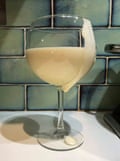
The method
McAlpine describes her method as “slightly unconventional”, though in fact quite a few recipes whisk the yolks and sugar together off the heat before any Cook can take place, and with good reason – particularly daring chefs may be happy to make zabaglione directly in the pan, but I’d recommend a bain marie because, to quote McGee, “the mix thickens at such a low temperature that direct heat can quickly overcook it”.
Hazan suggests her red-wine version is best served cold. The danger of this is that the mixture separates (though if it does, it can usually be whisked back together), but we all agree that we prefer zabaglione warm in any case: chilling it dulls the flavour. If you would like to serve it cold, however (and I have some sympathy with Anna Del Conte’s complaint that “zabaglione is lovely, but I do find it very tiresome to have to get up from the table and retire to the kitchen to make it”), I’d recommend whisking in some whipped cream, as she suggests in Amaretto, Apple Cake and Artichokes, to help stabilise the mixture.
Either way, zabaglione is very good served over fruit, on a bed of crushed amaretti, or as a hot shot of pure festive joy.
Perfect zabaglione
Prep 2 min
Cook 8 min
Serves 4
4 egg yolks
3 tbsp soft brown sugar
4 tbsp marsala or dessert wine
1 tbsp brandy (optional)
1 pinch salt
Nutmeg, to serve (optional)
Find a heatproof bowl that will sit over, but not touch, a pan of simmering water, and put that water on to boil.
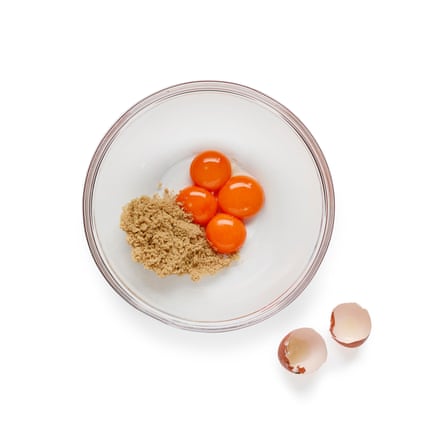
Put the egg yolks and sugar in the bowl and whisk until thick and creamy. Gradually beat in the alcohol and salt, then set the bowl over the pan and continue to whisk, scraping the base of the bowl as you go, until the whisk leaves an impression in the mixture and, when lifted up, drops a fairly solid ribbon trail on the surface of the mixture.
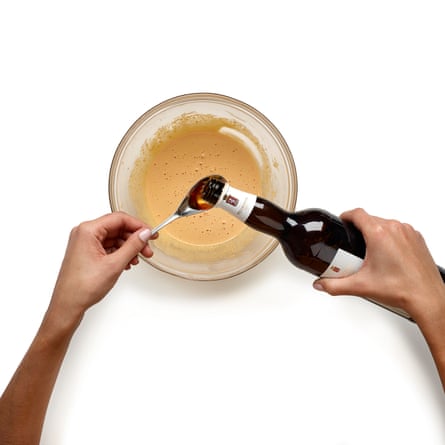
Remove the bowl from the pan and put on a cool surface. Keep whisking for another couple of minutes, then divide between bowls and serve (I like a grating of nutmeg on top).
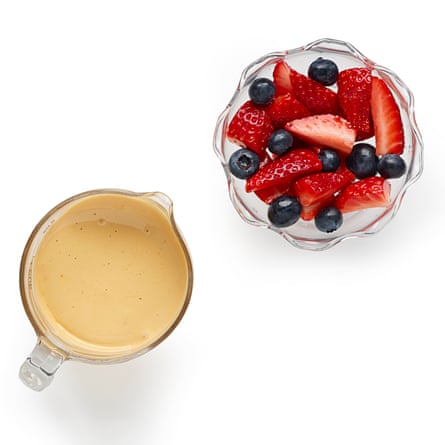
Zabaglione or sabayon: do you have fond memories of this classic Italian dessert, or do you have another last-minute festive favourite up your sleeve? And if you are a zabaglione fan, what do you do with all the excess egg whites?
Fiona Beckett’s wine match
“Christmas is the ideal occasion to drink vintage port which needs consuming within a couple of days of opening the bottle (there’s your excuse!). It also needs decanting, but remember to keep the bottle upright before you start and pour steadily in a single movement so that the sediment doesn’t fall back into the bottle. Sainsbury’s has a smooth, velvety 2003 in their Taste the Difference range on offer at £18 (20%).”
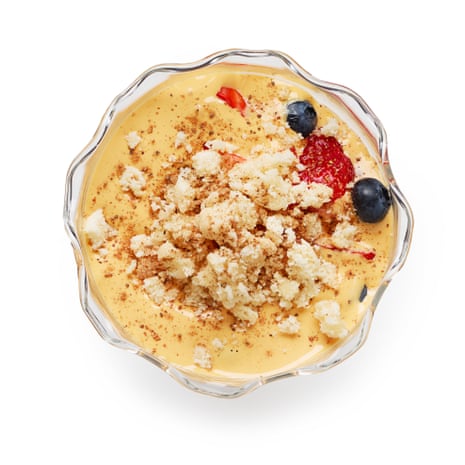
Comments (…)
Sign in or create your Guardian account to join the discussion